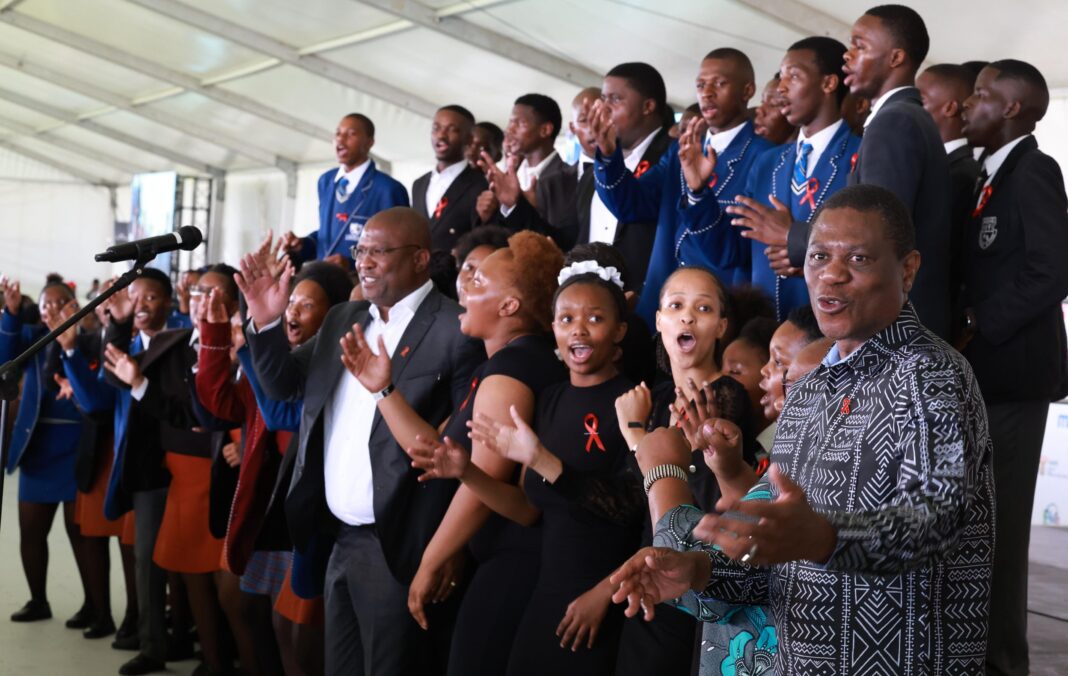By Johnathan Paoli
Deputy President Paul Mashatile on Sunday reiterated South Africa’s commitment to ending HIV and AIDS epidemic by 2030, emphasizing the importance of equitable healthcare access for all, regardless of income, gender, ethnicity, or sexual orientation.
Delivering the keynote address at World AIDS Day commemoration at the Sisa Dukashe Stadium in Mdantsane, Eastern Cape, Mashatile, as Chairperson of the South African National AIDS Council (Sanac), highlighted the importance of this year’s theme, “Equal Rights, Equal Care.”
“As we commemorate this year’s World AIDS Day, it is also an appropriate time to reflect on the progress we have made and recommit ourselves to doing whatever it takes to achieve our collective vision of an AIDS-free world, as well as to stand in solidarity with the millions of people living with HIV in our country and around the world,” he said.
Mashatile highlighted South Africa’s achievements in the fight against HIV and AIDS, including advancements in antiretroviral therapy (ART), which have extended the lives of millions.
However, he said the country remains the global epicenter of the HIV epidemic, with nearly 8 million people living with HIV and tuberculosis (TB) continuing as the leading cause of death.
Mashatile also stressed that addressing the scourge requires a comprehensive, inclusive, and community-focused approach.
He noted significant progress in HIV prevention, including the introduction of injectable antiretrovirals, which have shown promise in clinical trials conducted in South Africa.
He said, however, access to these medicines remains limited in the Global South compared to the North, confirming that Sanac plans to establish a multi-sectoral working group to expedite the availability of these treatments and bridge the gap.
Mashatile also addressed the disparities in achieving UNAIDS targets, and said while 95% of people living with HIV are aware of their status, only 79% of those diagnosed are on treatment, and 93% of treated individuals achieve viral suppression.
He said efforts to improve treatment initiation and adherence remain critical.
Mashatile praised community-centered interventions as essential to reducing stigma and increasing health literacy, particularly among youth, with programs such as the Zikhala Kanjani Youth HIV Prevention Strategy and digital tools like the B-Wise App empowering young people with tailored health education and support.
The DP emphasised the vulnerability of adolescent girls and young women, who account for a disproportionate number of new HIV infections.
He said interventions tailored to this demographic, including the #ForeverWena campaign, are being scaled to address their unique challenges and the Global Alliance to End AIDS in Children by 2030 remains a cornerstone of efforts to eliminate vertical transmission of HIV.
He lauded the province for launching its Global Alliance Action Plan, becoming the first province to implement a localised strategy to combat pediatric HIV, urging other provinces to follow suit.
Mashatile called for a multi-sectoral approach to tackle Gender-Based Violence, emphasising the need for economic empowerment of women and girls, while activities like the Sanac Men’s Sector’s Better Man 4 Tomorrow campaign aim to engage men in promoting health and addressing social ills that perpetuate the HIV epidemic.
Mashatile urged government departments, civil society, traditional leaders, and other stakeholders to unite in tracing and linking 1.1 million people living with HIV to treatment by December next year, a critical step toward achieving the UNAIDS 95-95-95 targets.
Meanwhile, the ANC similarly commemorated the day, highlighting the significant strides made by South Africa over the past 30 years of democracy, including advancements in treatment and prevention.
ANC spokesperson Mahlengi Bhengu-Motsiri praised key achievements including reducing mother-to-child transmission rates to below 2% and providing ARTs to over 5 million people, dramatically lowering AIDS-related deaths.
She said that despite these successes, the impact of HIV and AIDS remains a pressing concern in the country, emphasising that the disease continues to strain the healthcare system and economy while affecting millions of lives.
“South Africa’s fight against HIV and AIDS exemplifies both progress and ongoing challenges. The ANC honors the resilience of those living with HIV and renews our commitment to an AIDS-free future,” Bhengu-Motsiri said.
She commended awareness campaigns and efforts to reduce stigma, noting their role in preventing new infections and supporting those living with HIV, urging citizens to unite in ensuring equity and dignity for all, marking World AIDS Day as both a celebration of progress and a call to action.
INSIDE POLITICS

